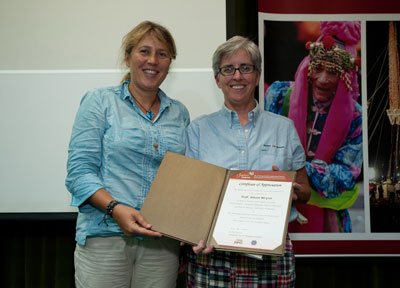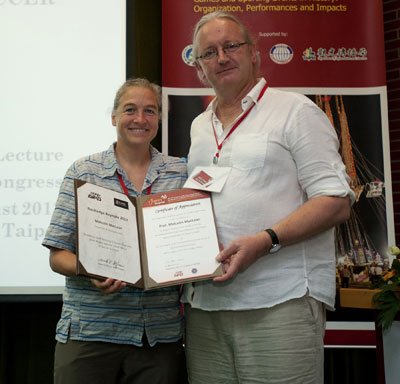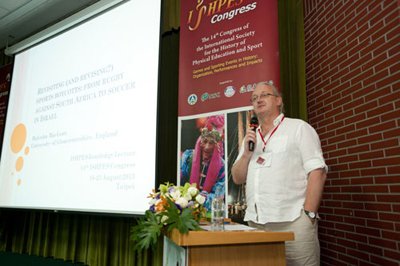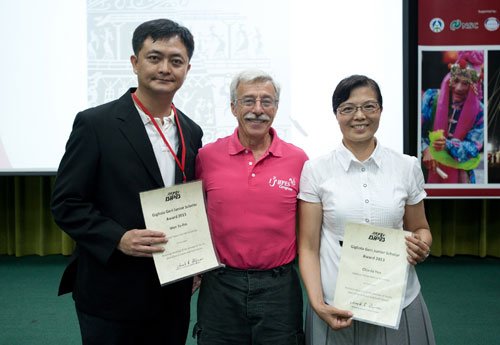ISHPES is please to announce the winners for 2013 ISHPES Award, Alison Wrynn, and the 2013 Routledge Keynote Speaker, Malcolm MacLean.
| Dr. Alison M. Wrynn is the winner of the 2013 ISHPES Award. Alison Wrynn is a professor in the Department of Kinesiology at California State University, Long Beach. The ISHPES Award is given to acknowledge longstanding members for their academic work in the field of sport history and the contribution to ISHPES. Alison Wrynn has attended many ISHPES conferences over the years. She is an internationally known scholar with over 150 publications. Among her many research areas are women and sport and Olympic topics. She is especially known for her research on health, injury and disability, an area that has been neglected in sport history. Throughout her academic career she has received a number of national honors. This is her first international award. |  |
In honor of her award, Alison Wrynn gave a keynote speech, “On the margins: Therapeutic massage, physical education and physical therapy — Defining a profession”, at the 2013 Congress in Taiwan.
The American physical therapy profession emerged during and following the First World War as a result of the need for trained providers of therapeutic exercise—who practiced under the supervision of a physician—for the rehabilitation of injured soldiers. Most of these pioneer physical therapists came to the profession with a background in corrective exercise developed in women’s physical education programs at a variety of colleges and universities throughout the country. It was female physical educators, almost exclusively, who would train to be the new rehabilitation aids—the foundation of the profession of physical therapy. A number of scholars have examined the therapeutic exercise components of physical education that migrated their way into physical therapy practice but less focus has been placed on the use of massage as a therapeutic tool in physical therapy’s earliest years. The history of therapeutic massage within American physical education has not been fully examined despite its use in men’s physical education in the context of Athletic Training (early Athletic Trainers were sometimes called “rubbers” for their extensive massage practice) and in women’s physical education—as a result of its foundations in Swedish Gymnastics. Recently, Danish historian Per Jorgensen began to analyze the connections among massage practice, physical therapy and chiropractic in Denmark from 1900-1930. My central question focuses on an analysis of how the practice of massage was used in physical therapy, and the ways in which massage practitioners and physical therapists interacted and established their respective scope of practice in the first half of the twentieth century in the United States.
| Dr. Malcolm MacLean is the 2013 Routledge Keynote Speaker. Malcolm MacLean is a Reader in the Culture and History of Sport in the Faculty of Applied Sciences and the Associate Dean for Quality & Standards at the University of Gloucestershire. He presented his keynote talk, “Revisiting (and revising?) sports boycotts: from rugby against South Africa to soccer in Israel” at the 2013 ISHPES Congress in Taipei, Taiwan.
|
 |
For the first time in nearly 30 years, 2013 has seen increasing public awareness of the revival of calls for a comprehensive boycott of and sanctions on a state based on questions of an “entrenched system of racial discrimination” (A. Lim, ‘BDS Movement Call,’ The Case for Sanctions Against Israel, London: Verso, 2012, 23). The call to boycott South African sport emerged in the mid 1950s as the apartheid state was developing and refining its comprehensive and systematic legal form amid growing international pressure for decolonisation. This is a different social and political context than the call 50 years later by a wide group of organisations in Palestinian civil society for boycott, divestment and sanctions against Israel. As with the call for sanctions from South Africa, the Palestinian call had limited impact in the ‘west’ outside a small number of social areas – trade unions in the UK being among the most notable – until pressure was put on sports organisations to boycott competition; in the case of South Africa there was increasing pressure on the IOC, the Imperial Cricket Conference and International Rugby Board prevent sporting contact, while in the case of Israel the boycott call reached public consciousness in 2013 through the withdrawal of the physicist Stephen Hawking from an international academic conference and pressure on UEFA to halt its under-21 international football championship due to be held in Israel. This paper draws on analyses of international anti-apartheid movements’ campaigns against sporting contact with South Africa and the BDS call for the isolation of the Israeli state to consider the place of and potential for sports boycotts. It looks at the anti-apartheid campaigns, especially those in the early 1960s, to consider ways in which the BDS campaign has an impact on existing historical understandings of cultural boycotts as a tactical and strategic campaign tool.
 |
 |

